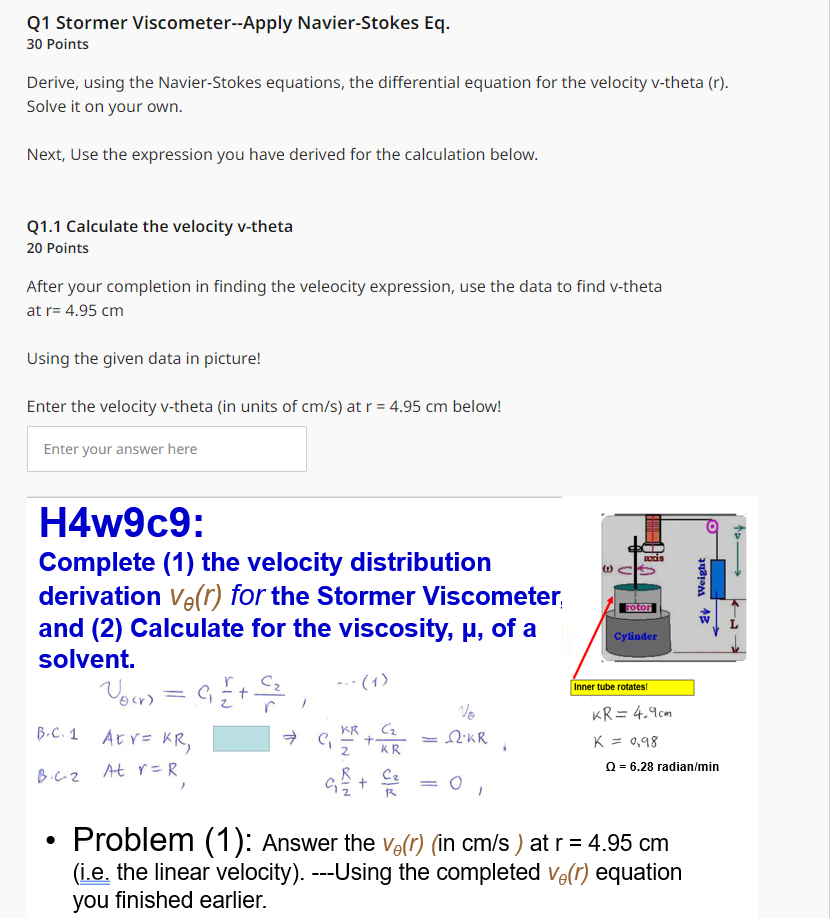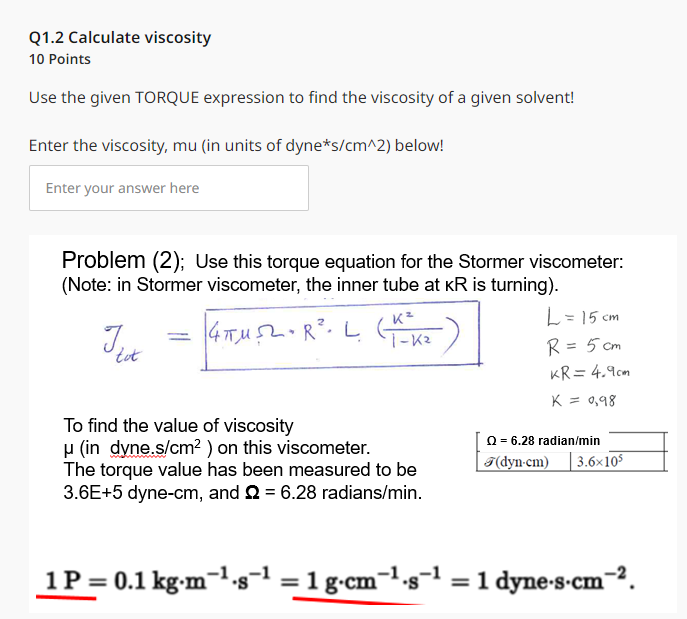

Q1 Stormer Viscometer--Apply Navier-Stokes Eq. 30 Points Derive, using the Navier-Stokes equations, the differential equation for the velocity v-theta (r). Solve it on your own. Next, Use the expression you have derived for the calculation below. Q1.1 Calculate the velocity v-theta 20 Points After your completion in finding the veleocity expression, use the data to find v-theta at r=4.95cm Using the given data in picture! Enter the velocity v-theta (in units of cm/s ) at r=4.95cm below! H4w9c9: Complete (1) the velocity distribution derivation v(r) for the Stormer Viscometer: and (2) Calculate for the viscosity, , of a solvent. - Problem (1): Answer the v(r) (in cm/s ) at r=4.95cm (i.e. the linear velocity). ---Using the completed v(r) equation you finished earlier. Q1.2 Calculate viscosity 10 Points Use the given TORQUE expression to find the viscosity of a given solvent! Enter the viscosity, mu (in units of dyne* s/cm2 ) below! Problem (2); Use this torque equation for the Stormer viscometer: (Note: in Stormer viscometer, the inner tube at KR is turning). Jtot=4R2L(1k2k2)L=15cmR=5cmkR=4.9cmk=0,98 To find the value of viscosity (in dyne. /cm2 ) on this viscometer. The torque value has been measured to be 3.6E+5 dyne- cm, and =6.28 radians /min. 1P=0.1kgm1s1=1gcm1s1=1dynescm2 Q1 Stormer Viscometer--Apply Navier-Stokes Eq. 30 Points Derive, using the Navier-Stokes equations, the differential equation for the velocity v-theta (r). Solve it on your own. Next, Use the expression you have derived for the calculation below. Q1.1 Calculate the velocity v-theta 20 Points After your completion in finding the veleocity expression, use the data to find v-theta at r=4.95cm Using the given data in picture! Enter the velocity v-theta (in units of cm/s ) at r=4.95cm below! H4w9c9: Complete (1) the velocity distribution derivation v(r) for the Stormer Viscometer: and (2) Calculate for the viscosity, , of a solvent. - Problem (1): Answer the v(r) (in cm/s ) at r=4.95cm (i.e. the linear velocity). ---Using the completed v(r) equation you finished earlier. Q1.2 Calculate viscosity 10 Points Use the given TORQUE expression to find the viscosity of a given solvent! Enter the viscosity, mu (in units of dyne* s/cm2 ) below! Problem (2); Use this torque equation for the Stormer viscometer: (Note: in Stormer viscometer, the inner tube at KR is turning). Jtot=4R2L(1k2k2)L=15cmR=5cmkR=4.9cmk=0,98 To find the value of viscosity (in dyne. /cm2 ) on this viscometer. The torque value has been measured to be 3.6E+5 dyne- cm, and =6.28 radians /min. 1P=0.1kgm1s1=1gcm1s1=1dynescm2








